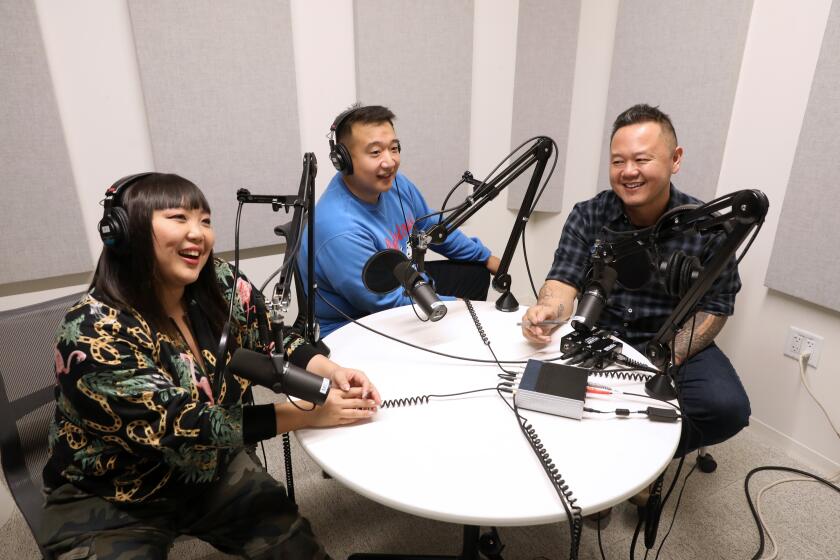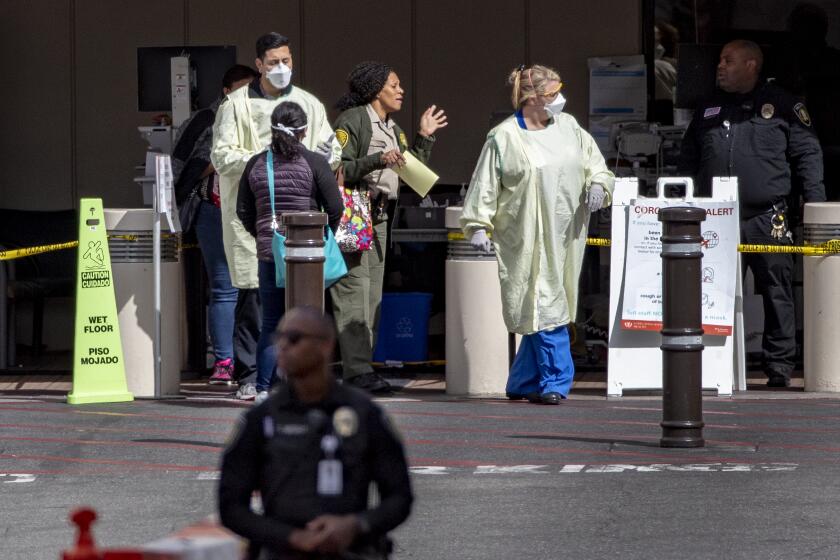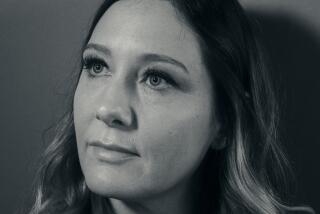‘The Farewell’ director Lulu Wang on fighting Hollywood and coronavirus
Lulu Wang always wanted to tell a story about her own family. When a visit to see her ailing grandmother in China became the crux of a dramatic family secret, her trip became the basis of her hit 2019 drama, “The Farewell,” which won a Golden Globe for star Awkwafina and two Film Independent Spirit Awards for best feature and supporting actress Zhao Shuzhen in the grandmother role.
Wang’s fight to tell that story, about family ties, cultural difference and intergenerational Asian American identity, was hard won. At first, industry execs didn’t get it. They told her she was trying to say too much. But for the director, whose Chinese diplomat father and journalist mother immigrated to Miami when she was 6 years old, all of those threads were woven into one.
“I don’t know how to tell a story about losing my grandma without the perspective of an immigrant, because that that’s connected,” Wang said when she visited the L.A. Times studio to dive into her life and work with me and columnist Frank Shyong on “Asian Enough,” a new podcast we co-host about being Asian American.
Wang talked about fighting to tell her own authentic story in “The Farewell,” in which she cast her own great aunt, and how to make Hollywood more inclusive. She also updates the true family lie that inspired “The Farewell.”
On the new podcast “Asian Enough,” L.A. Times entertainment reporter Jen Yamato and columnist Frank Shyong will interview guests about what being Asian American means to them and that who they are is enough.
Since recording the episode just a month ago, however, the world has seen immeasurable change. Like most industries, Hollywood hit pause amid a devastating pandemic. The full health and economic ramifications of COVID-19 have yet to come into view. Doctors and hospitals are running out of protective masks and gear and turning to the public for help.
Wang, now working from home on her next project, the Amazon series “The Expatriates,” has added her voice to a homegrown effort to collect much-needed N95 masks and protective medical supplies from the Los Angeles community on behalf of emergency room and medical personnel.
After tweeting out and amplifying a friend’s call for donations March 19, Wang received hundreds of replies and says that they were able to collect 300 masks within the first 12 hours. In the last week their effort resulted in donations of 1,000 masks and 1,000 gloves from across the city, which were delivered to medical personnel who distributed them further. The grassroots effort continues with drop-off locations around L.A.
Q&A: Here’s why medical safety supplies are short, and what you can do to help hospitals and first responders who need gear.
“I’ve gotten so many messages from people saying, ‘Can you help us do what you guys did? Can you help my friend’s hospital? Can you help my brother, who’s a doctor at this place? I saw what you did on Twitter — can you help us do the same thing?’ ” said Wang on Monday, adding that she hopes that people in other cities can rally similar efforts in their own communities.
As for the future of making movies and telling stories, Wang says she is grateful to be able to work safely at a time when so many others cannot. After hosting a spontaneous bartending pop-up Q&A just last month in Los Angeles, she is one of many artists taking to social media platforms to stay connected to their communities while apart, as in a recent livestreamed Instagram Q&A she hosted with partner and fellow filmmaker Barry Jenkins.
“I think it’s an important time to be more transparent and to be more connected to community than ever,” Wang said. “If we can do something fun or helpful, it helps everybody. It helps me cope, certainly.”
“The Farewell” (a very American story and a U.S. production) was classified at the Golden Globes as a “foreign” film. The fight for the film to be seen as American seems similar in a lot of ways what Asian Americans go through. Why did you push back against some industry suggestions that you change the story?
So often in Hollywood ... there’s such a cynicism that you pitch a story, and it’s immediately like, ‘How do we make it like that other successful movie?’ And when your film doesn’t have a lot of comps, which is the industry term for comparisons ... you have to name a comp that’s similar in tone, similar in plot and then also successful at the box office.
When you’re trying to do something original, you can’t have that. That was the pushback from the people I initially pitched: “You have to change it to be more like one of these other films that already exist.” I was trying to say, actually, I’m trying to do something that hasn’t been done. It’s based on my own experience, and that’s why I want to make it, because I haven’t seen this before.
We’ve had to tell stories about our own families on occasion. But then there is this really complicated responsibility that you take on, and you’re so scared to get it wrong.
Absolutely. It was a really interesting experience, because the story is about two points of views. I mean, there are many points of view ... my family’s, the family in China and mine as an American, which is to tell [my grandmother] the truth. But I knew that I didn’t want to tell a story that was biased and that existed only to prove my point of view. I was telling the story as a way to explore the questions that I had: Why is this, and how do you deal with this? Because there is no simple answer.
At the Sundance world premiere Q&A someone shouted out, ‘What do your parents think?’ Your dad was in the audience, and he shouted back...
“Pretty good!” [Laughs]
How do you see yourself in relation to your parents’ life stories and what brought them to Miami, where you grew up?
My dad used to be a Chinese diplomat in the Soviet Union. My mother was a journalist, a writer in Beijing. We came over to the States when I was 6. As I was growing up, I always said to my parents that they had such interesting lives and that nothing was ever going to happen to me, that my life was never going to be interesting. Which is also kind of the goal for immigrant parents: They’re like, “We don’t want your life to be that interesting, that hard.”
When I moved out to L.A., I wanted to make films. I made a film and then I was really, really struggling. And I was like, “I’ve done the thing that is so hard, which is to make your first film, and it didn’t work out. Maybe I’m not meant to be a filmmaker.”
That’s when my mom said, “Remember when you were younger and you would always say we had such interesting lives? You know, we really took a chance. This is your moment. This is your journey. So you’ve got to keep going.”
But my mom had a very different response from my father. I think she’s proud, but she expresses it very differently. She considers herself an American, 100%. But because she didn’t come over till she was in her 30s, her perspective is more Chinese. Every time she would read the script, she was like, “There are things you don’t understand about China, and you need to understand them in order to tell the story.” And I would say, “But do I?”
This is a really common thing, which is that Asians in Asia don’t necessarily see “Asian American” as its own separate identity, that it’s like a watered-down version of Asian. That they just have a lack of understanding. That was something that my mother and I struggled with, especially because she is a writer in her own right. I had to say, “OK, I can take certain things from you. But there are other things that, we’re just two different people. We’ve lived two different lives and we have two different perspectives.”
At first, your father wasn’t sure why anyone would find him or the family’s story interesting. Why is that?
Now I think he has a little bit of an easier time trusting me. Back then, I was also an unproven filmmaker to him as well as the rest of the world. He was very confused why a production company was going to give me millions of dollars to tell this story. And I think it’s because he hasn’t seen a lot of those stories onscreen. His version of what a movie is stars Arnold Schwarzenegger and Bruce Willis. ... It is the power of media to inform your perspective of what is of value and what is not.
It’s like my great aunt, [Hong Lu,] too. There’s a self-deprecation where when I wanted to cast her and she said, “My fat face is going to ruin your film.” She kept saying that and laughing about it.
But she’s so good!
She’s so good! And she would always say that in a self-deprecating way. Sometimes it’s funny, but it’s also like, “Why are you saying that about yourself? ... You’re real. Who else is better to play you than you?”
Writing about Chinese immigrants in the San Gabriel Valley, a really common question was, ‘Why do you want to know this?’
That’s also the response a lot of my Asian friends have told me they get from their parents when they try to find out their history. As our parents and grandparents are getting older, they say, “Tell me about when you were in the war, or when you went through this or that.” And the common response is, “Why do you want to know?” Because I think for them, it’s like, “Why go back into that pain? I’ve had to let it go in order to survive; in order to move on. Why revisit that?”
That’s similar to “The Farewell,” where the family doesn’t want to tell [their grandmother] because it’s like, what is the purpose of going into this pain?
Asians, especially Asian immigrants, need stories. Having your story told does something for you. Do you think it’s done something for your family?
Absolutely. I think that it’s helped everyone to make sense of it a little bit. I’m not saying it’s solved problems. But I do think it was therapeutic. Especially for my great aunt, because she held onto so much of that on her own. ... Afterward, I asked her. And she said it was very therapeutic for her.
At the Spirit Awards where “The Farewell” won best feature, you delivered the best speech and called for female directors to simply be hired more. What was behind that speech?
People keep asking me, “How do we empower women? How do we solve this problem of bringing more women in?” And I’d go home and wish I’d said, “Just give them the job.” It’s not that complicated. Because really the only reason I was on that stage and had success with “The Farewell” is because somebody took a chance on me.
If you look at all of the men who were nominated this year at the Oscars, ask them how many shadowing programs they’ve done. Ask them how many diversity programs they’ve done. Just give [female filmmakers] the money. Give them, coming out of Sundance, the same kind of opportunities studios have given men, and white men, to take that leap.
The above podcast excerpt, conducted by co-hosts Frank Shyong and Jen Yamato, has been edited and condensed for length and clarity. Listen to the full episode of “Asian Enough” with special guest Lulu Wang or episodes with novelist Viet Thanh Nguyen or actor John Cho and subscribe to the podcast here.
More to Read
Only good movies
Get the Indie Focus newsletter, Mark Olsen's weekly guide to the world of cinema.
You may occasionally receive promotional content from the Los Angeles Times.













